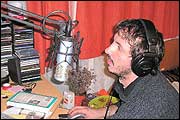Unitarian radio station has global ambitions
Transylvanian Internet radio station broadcasts Unitarian values, adds English-language programming.
The station was founded by the Rev. Zsolt Solymosi, a Transylvanian Unitarian minister who also teaches at the Unitarian High School in Kolozsvár. Solymosi was a Balázs Scholar at Starr King School for the Ministry in the 2005-2006 school year, where he became interested in electronic media. “I discovered that lots of religious groups have radio stations all around the world,” he said. “I decided that this denomination needed an alternative voice and a way to reach out to people.”
Unitarianism has deep roots in Transylvania—a section of northwest Romania—stretching back to the 16th century. Unitarianism is still a dynamic force in this area, with Unitarian churches playing a leading role in village life today. Transylvanian Unitarians, who are ethnically Hungarian, speak Hungarian as their primary language.
While the station broadcasts most of its programs in Hungarian, it does conduct programs in Romanian and started two weekly English-language broadcasts in February.
Solymosi hopes that TUR will increase contact between Unitarian Universalists worldwide and Transylvanian Unitarians. Many partnerships have already been established between North American UU congregations and Transylvanian churches through the UU Partner Church Council. The radio station, however, has the potential to reach a much wider audience. “The feedback so far is wonderful,” Solymosi said. After the first English-language broadcast, he reported responses from listeners in the United States, England, Canada, and Norway. The station hopes to be able to broaden its audience to include Unitarians in the Philippines and the Khasi Hills of India.
The station is run using volunteer labor. Many of the students at the high school where Solymosi teaches in Kolozsvár help keep the station running 24 hours a day. Ben Legg, an English-language instructor at the Protestant Theological Institute sponsored by Meadville Lombard Theological School, has also provided assistance. Solymosi, however, is in charge of the content. “We talk about life and social justice issues,” he said, although he was quick to add that the station wasn’t set up as a missionary tool. Music, he said, ranges from rock to jazz to Transylvanian folk music.
“The programming continually underscores in talk and music that Unitarians are open, tolerant, and non-dogmatic,” said Bob Tripp, a member of the UU Congregation of Fairfax, Va., who led a group of five American supporters in raising almost $7,000 for the station. “So far we’ve been amazed at the number of people listening.”
Many of the talk shows focus on the lives of prominent Unitarian Universalists. On Tuesday, March 6, Solymosi interviewed the Rev. Leon Hopper, UU minister and one of the founders of the UU Partner Church Council, which was responsible for re-establishing relationships with Transylvanian Unitarian churches after the end of Communist rule in Romania.
Listeners can access the station through the radio website (see link in sidebar). Special software may be required.
See sidebar for links to related resources.








